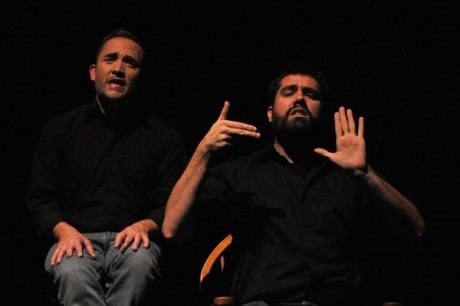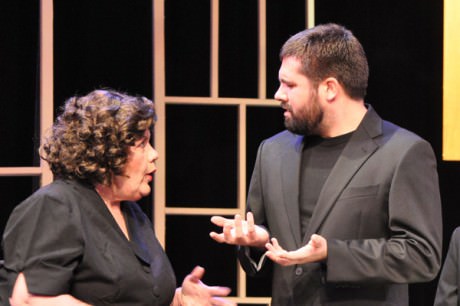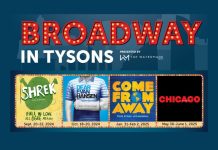Alex Bryce is giving a powerful performance as Ty Williamson in Dominion Stage’s production of Del Shores’ popular play Sordid Lives. Alex explains how he works ‘side-by-side’ with Shawn g. Byers, who is his ‘voice interpreter.’

Joel: How did you get involved with Dominion Stage’s Sordid Lives?
Alex: I first got involved with Dominion Stage in late 2012 when the former Dominion Stage President Dave Moretti was looking for volunteers to help with the set construction for Avenue Q. I continued to help with the set construction for Bent. In August, he helped out with the auditions for Sordid Lives. I had originally planned to help with the set construction for Sordid Lives but when I asked him how the auditions went, he told me that all parts were cast except the role of Ty and suggested that I try out for it. My initial reaction was to say, “no,” because I didn’t feel comfortable on the stage. I didn’t want my deafness to be used as a gimmick or to stick out like a sore thumb among a cast full of hearing non-signers. But I liked the script. I realized that my deafness would make my character interesting and highlight certain personality traits in both my character and my character’s mother. With some encouragement from friends, I decided I needed to step out of my comfort zone and try out for the role. I’m happy I did!
Tell us about the Ty. How do you relate to him and how did you prepare to play him?
My character is a closeted gay man in his mid-twenties struggling with homophobia (both internal and external). He eventually comes out of the closet and reconciles with his friends and his mother.
Like any other queer individual, I’ve had to cope with internal and external homophobia in my decision about whether to come out as a gay man. I’ve had to reconcile my own skewed perception of homosexuality (as influenced by society and family) with my own identity as a Deaf gay man. Without going into too many personal details, I can identify with Ty’s pain and struggle to come out and the fear of being rejected. I drew upon some of those personal experiences to portray Ty in my monologues.
What is Sordid Lives about from the point of view of Ty?
Sordid Lives is about accepting the fact that no matter how much you maintain the façade of a perfect life, cracks will always seep through. It’s important to accept your flaws and to be honest—not only with yourself, but with everybody else as well—because you will be happier in the long run. All human beings are flawed, yet capable of surprising love and humility if given the chance.
What were some of the suggestion Director Rick Hayes gave you that has helped mold your performance?
Both Rick and the Stage Manager/Producer Bill Parker gave me very helpful suggestions on delivering my lines. While I had the words memorized, I struggled on how to say the lines in a funny or meaningful way. They helped me understand the tone behind the lines I was signing. They also gave me suggestions on how to portray some of the individuals I refer to in my monologues.
What were some of the challenges you faced in working with Shawn?
My main challenge was definitely syncing with my voice actor, Shawn Byers. Contrary to popular belief, American Sign Language and English are different languages with their own speaking rhythm, grammar, and syntax. There were some lines that I could sign faster than Shawn could speak, and there were some lines that Shawn could speak faster than I could sign. There are certain lines and words that we wanted to make sure we spoke together for the maximum effect. In addition, we both read the script differently, so we needed to agree on how to deliver the lines. We spent nearly the entire rehearsal each day alone just becoming familiar with each other’s performances and getting our timing right.
What do you admire most about your fellow cast members?
During rehearsals, I work closely with Shawn, my voice actor. Because Shawn has a lot of theater experience, he taught me how to read a play script and we talked about how each line should be said. I never realized how challenging it is to read a play script and figure out the significance of each line for my character until I started working with Shawn.
Sordid Lives has a fantastic cast with a wide array of theater backgrounds. We always support each other with snacks and treats. We often pitch in for each other—if an actor couldn’t make rehearsal, another person will step in. It’s always funny to watch another actor’s take on that character!
Because of my limited theatrical experience, it was sometimes overwhelming trying to remember not only my lines and delivery, but also, how to move around on the stage and the other characters’ dialogues for my cues. I am honestly impressed with how well the other characters were able to memorize their parts, considering how much they have to remember!
What are some of the roles you have played before on the stage?
This is my first theatrical performance as an adult! When I was a young teenager, I had been involved with the Vermont Chapter of Kids on the Block and Puppets in Education, where I played a Deaf character that helped a puppet find her missing kitten in a short skit designed to teach kids about deafness.
You have worked on several sets in other Dominion Stage productions. Did you help build it?
For this production, I didn’t really work on the set design or construction aside from some painting when it didn’t conflict with my rehearsals.
As a member of the Deaf Theatre community tell us about the local Deaf Theatre Scene and where our readers can come see productions performed by deaf actors. Which deaf actors in the area are your favorites and why?
Gallaudet University has several productions throughout the school year. Their Spring 2012 production of Hamlet was simply… mind-blowing. They also did Waiting for Godot in Winter 2012/2013 that was darkly comedic, yet melancholic. Their spring 2012 production of Alice in Wonderland (Spring 2012) had an amazing set and costume design.
Gallaudet University Theatre will produce Broken Spokes, a play written by Willy Conley, a Deaf playwright, on October 17-19th and October 24th-26th. They are also producing Lysistrata on October 31st through November 3rd. Although produced for Deaf audiences, they do try to make their productions accessible to the hearing community (via voice interpreters, open captions, non-verbal plays).
Outside of Gallaudet, James Caverly, a Deaf actor and a Gallaudet graduate, is featured in SpeakEasy Stage Company’s production of Tribes, running through October 19th .
Gallaudet Theatre’s Facebook page has information on their performances. Occasionally, they will also provide information about other performances in the area that either feature Gallaudet alumni or offer interpreted performances.
How do you think local theatres could reach out more to the deaf theatre community?
As an audience member, I can definitely say that I’d appreciate more interpreted performances. While The Kennedy Center and other major theatres will often provide interpreted performances, I am not aware of other local theatres that offer interpreted performances. I occasionally go to plays with friends, especially to support my friends in their productions. While I never regret the time spent supporting them, I don’t always get much out of the performance itself because I don’t know what’s being said. It’s like a hearing person paying to watch a movie in a movie theater with no sound system.
I realize providing interpreters or open captions can be quite cost-prohibitive, but it would go a long way toward making local theater productions more Deaf-friendly.
There is an interpreted performance on Saturday, October 19th at 8 PM. Tell us what an interpreted performance is and what audiences will see. What is the difference between a ‘signed’ performance and an ‘interpreted’ performance?
To me, a signed performance implies that the play incorporates sign language. Therefore, my involvement in the play could be considered a signed performance. There will be an interpreted performance on Saturday, October 19th. On that night, two interpreters will provide an ASL interpretation of the play to Deaf audience members who need it. They will be situated in the front of the stage, and any person who needs the play interpreted can sit near them and enjoy the show.
It would be awesome for the Deaf community to come to our play and support the local community theater. I sometimes feel that local theatre companies don’t realize that Deaf people can enjoy theatre too and miss an opportunity to reach out to them. It would be a great opportunity for Deaf people to show that we would support local productions if interpreters are provided.

What has been the most rewarding experience for you working at Dominion Stage on Sordid Lives?
I’ve definitely grown as a person. I’ve always said that I have a horrid memory and that I have stage-fright. It’s been a good challenge to step out of my comfort zone and to discover some talents I never knew I had, to discover something I never realized I would actually enjoy. It’s been a great experience to work with everybody on the production itself.
Sordid Lives plays through October 27, 2013 at Dominion Stage performing at Gunston Arts Center – Theatre One – 2700 S. Lang Street, in Arlington, VA. For tickets, purchase them online, or at the door.
LINK
‘Sordid Lives’ review by Eliza Anna Falk on DCMetroTheaterArts.





